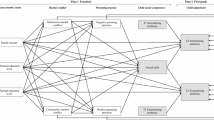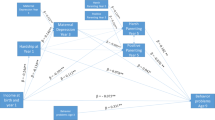Abstract
This paper provides a comprehensive review of empirical evidence linking parental nonstandard work schedules to four main child developmental outcomes: internalizing and externalizing problems, cognitive development, and body mass index. We evaluated the studies based on theory and methodological rigor (longitudinal data, representative samples, consideration of selection and information bias, confounders, moderators, and mediators). Of 23 studies published between 1980 and 2012 that met the selection criteria, 21 reported significant associations between nonstandard work schedules and an adverse child developmental outcome. The associations were partially mediated through parental depressive symptoms, low quality parenting, reduced parent–child interaction and closeness, and a less supportive home environment. These associations were more pronounced in disadvantaged families and when parents worked such schedules full time. We discuss the nuance, strengths, and limitations of the existing studies, and propose recommendations for future research.


Similar content being viewed by others
References
ABS. (2009). Work, life and family balance, Australian social trends (No. 6361.0). Canberra, ACT: Australian Bureau of Statistics.
Achenbach, T. M. (1991). Manual for the child behavior checklist/4–18 and 1991 profile. Burlington: University of Vermont, Department of Psychiatry.
Barnett, R. C. (2006). Relationship of the number and distribution of work hours to health and quality-of-life (QOL) outcomes. In P. L. Perrewe & D. C. Ganster (Eds.), Research in occupational stress and wellbeing (Vol. 5, pp. 99–138). New York: Elsevier Ltd.
Barnett, R. C., & Gareis, K. C. (2007). Shift work, parenting behaviors, and children’s socioemotional well-being: A within-family study. Journal of Family Issues, 28, 727–748.
Barnett, R. C., Gareis, K. C., & Brennan, R. T. (2008). Wives’ shift work schedules and husbands’ and wives’ well-being in dual-earner couples with children: A within-couple analysis. Journal of Family Issues, 29, 396–422.
Barton, J., Aldridge, J., & Smith, P. (1998). The emotional impact of shift work on the children of NS workers. Scandinavian Journal of Work, Environment & Health, 24(Suppl. 3), 146–155.
Beck, A. T., Steer, R. A., & Carbin, M. G. (1988). Psychometric properties of the Beck Depression Inventory: Twenty-five years of evaluation. Clinical Psychology Review, 8, 77–100.
Bradley, R. H. (2002). Environment and parenting. In M. H. Bornstein (Ed.), Handbook of parenting: Vol. 2: Biology and ecology of parenting (pp. 281–314). Mahwah, NJ: Lawrence Erlbaum Associates.
Bronfenbrenner, U. (1979). The ecology of human development: Experiments by nature and design. Cambridge, MA: Harvard University Press.
Bronfenbrenner, U. (Ed.). (2005). Making human beings human: Bioecological perspectives on human development. Thousand Oaks, CA: Sage Publications, Inc.
Brooks-Gunn, J. (1995). Children in families in communities: Risk and intervention in the Bronfenbrenner tradition. In P. Moen, G. H. Elder, & K. Luscher (Eds.), Examining lives in context: Perspectives on the ecology of human development (pp. 467–519). Washington, DC: American Psychological Association.
Brooks-Gunn, J., Brown, B., Duncan, G. J., & Moore, A. K. (1995). Child development in the context of family and community resources: An agenda for national data collections. Washington, DC: The National Academy of Sciences.
Brooks-Gunn, J., Han, W.-J., & Waldfogel, J. (2002). Maternal employment and child cognitive outcomes in the first three years of life: The NICHD Study of Early Child Care. Child Development, 73, 1052–1072.
Brooks-Gunn, J., Han, W.-J., & Waldfogel, J. (2010). First-year maternal employment and child development in the first seven years. Monographs of the Society for Research in Child Development (SRCD), 75, 1–147.
Bumpus, M. F., Crouter, A. C., & McHale, S. M. (1999). Work demands of dual-earner couples: Implications for parents’ knowledge about children’s daily lives in middle childhood. Journal of Marriage and the Family, 61, 465−475. Retrieved from http://www.jstor.org/stable/353762.
Card, N. A., Sawalini, G. M., Stucky, B. D., & Little, T. D. (2008). Direct and indirect aggression during childhood and adolescence: A meta-analytic review of gender differences, intercorrelations, and relations to maladjustment. Child Development, 79, 1185–1229.
Champion, S. L., Rumbold, A. R., Steele, E. J., Giles, L. C., Davies, M. J., & Moore, V. M. (2012). Parental work schedules and child overweight and obesity. International Journal of Obesity, 36, 573–580.
Chase-Lansdale, P. L., Mott, F. L., Brooks-Gunn, J., & Phillips, D. A. (1991). Children of the National Longitudinal Survey of Youth: A unique research opportunity. Developmental Psychology, 27, 918–931.
Chaudry, A. (2004). Putting children first. New York: Russell Sage Foundation.
Cohen, J. (1988). Statistical power analysis for the behavioral sciences (2nd ed.). Hillside, NJ: Erlbaum.
Connelly, R., & Kimmel, J. (2011). The role non-standard work status in parental caregiving for young children. Eastern Economic Journal, 37, 248–269.
Daniel, S. S., Grzywacz, J. G., Leerkes, E., Tucker, J., & Han, W.-J. (2009). Nonstandard maternal work schedules during infancy: Implications for children’s early behavior problems. Infant Behavior and Development, 32, 195–207.
Davis, K. D., Crouter, A. C., & McHale, S. M. (2006). Implications of shift work for parent-adolescent relationships in dual-earner families. Family Relations, 55, 450–460.
Davis, K. D., Goodman, B., Pirretti, A. E., & Almeida, D. M. (2008). Nonstandard work schedules, perceived family well-being, and daily stressors. Journal of Marriage and Family, 70, 991–1003.
Dockery, A., Li, J., & Kendall, G. (2009). Parents’ work patterns and adolescent mental health. Social Science and Medicine, 68, 689–698.
Dunifon, R., Kalil, A., & Bajracharya, A. (2005). Maternal working conditions and child well-being in welfare-leaving families. Developmental Psychology, 41, 851–859.
Eccles, J. S. (1999). The development of children ages 6 to 14. The Future of Children, 9, 30–44.
Eisenberg, N., & Valiente, C. (2002). Parenting and children’s prosocial and moral development. In M. H. Bornstein (Ed.), Handbook of parenting: Vol. 5: Practical issues in parenting (2nd ed.). Mahwah, NJ: Lawrence Erlbaum Associates, Publishers.
Else-Quest, N. M., Hyde, J. S., Goldsmith, H. H., & Van Hulle, C. A. (2006). Gender differences in temperament: A meta-analysis. Psychological Bulletin, 132, 33–72.
Garey, A. I. (1999). Chapter 5: Motherhood on the night shift. In Weaving work and motherhood (pp. 108–139). Philadelphia: Temple University Press.
Gassman-Pines, A. (2011). Low-income mothers’ nighttime and weekend work: Daily associations with child behavior, mother-child interactions, and mood. Family Relations, 60, 15–29.
Gennetian, L. A., Lopoo, L. M., & London, A. S. (2008). Maternal work hours and adolescents’ school outcomes among low-income families in four urban counties. Demography, 45, 31–53.
Greenberger, E., O’Neil, R., & Nagel, S. K. (1994). Linking workplace and homeplace: Relations between the nature of adults’ work and their parenting behaviours. Developmental Psychology, 30, 990–1002.
Grzywacz, J. G., Daniel, S. S., Tucker, J., Walls, J., & Leerkes, E. (2011). Nonstandard work schedules and developmentally generative parenting practices: An application of propensity score techniques. Family Relations, 60, 45–59.
Han, W.-J. (2004). Nonstandard work schedules and child care decisions: Evidence from the NICHD study of early child care. Early Childhood Research Quarterly, 19, 231–256.
Han, W.-J. (2005). Maternal nonstandard work schedules and child cognitive outcomes. Child Development, 76, 137–154.
Han, W.-J. (2006). Maternal work schedules and child outcomes: Evidence from the National Survey of American Families. Children and Youth Services Review, 28, 1039–1059.
Han, W.-J. (2008). Shift work and child behavioral outcomes. Work, Employment & Society, 22, 67–87.
Han, W.-J., & Fox, L. E. (2011). Parental work schedules and children’s cognitive trajectories. Journal of Marriage and Family, 73, 962–980.
Han, W.-J., & Miller, P. (2009). Parental work schedules and adolescent depression. Health Sociology Review, 18, 36–49.
Han, W.-J., Miller, P., & Waldfogel, J. (2010). Parental work schedules and adolescents’ risky behaviors. Developmental Psychology, 46, 1245–1267.
Han, W.-J., & Waldfogel, J. (2007). Parental work schedules, family process, and early adolescents’ risky behavior. Children and Youth Services Review, 29, 1249–1266.
Hattery, A. J. (2001). Tag-team parenting: Costs and benefits of utilizing nonoverlapping shift work in families with young children. Families in Society: The Journal of Contemporary Human Services, 82, 419–427.
Henly, J. R., Shaefer, H. L., & Waxman, E. (2006). Nonstandard work schedules: Employer- and employee-driven flexibility in retail jobs. Social Service Review, 80, 609–634.
Hertzman, C. (1999). Population health and human development. In D. Keating & C. Hertzman (Eds.), Developmental health and the wealth of nations (pp. 153–184). New York: Guildford Press.
Heymann, J. (2000). The widening gap: Why America’s working families are in jeopardy and what we can do about it. New York: Basic Books.
Heymann, S. J., & Earle, A. (2001). The impact of parental working conditions on school-age children: The case of evening work. Community, Work & Family, 4, 305–325.
Hill, J. (2008). Discussion of research using propensity-score matching: Comments on “A critical appraisal of propensity-score matching in the medical literature between 1996 and 2003” by Peter Austin, Statistics in Medicine. Statistics in Medicine, 27, 2055–2061.
Hsueh, J., & Yoshikawa, H. (2007). Working nonstandard schedules and variable shifts in low-income families: Associations with parental psychological well-being, family functioning, and child well-being. Developmental Psychology, 43, 620–632.
Johnson, S., Li, J., Kendall, G., Strazdins, L., & Jacoby, L. (2013). Mothers’ and fathers’ work hours, child gender and behavior in middle childhood. Journal of Marriage and Family, 75, 56–74.
Jones-DeWeever, A., Peterson, J., & Song, X. (2003). Before and after welfare reform: The work and well-being of low-income single parent families. Washington, DC: Institute for Women’s Policy Research.
Joshi, P., & Bogen, K. (2007). Nonstandard schedules and young children’s behavioral outcomes among working low-income families. Journal of Marriage and Family, 69, 139–156.
Kalil, A., Ziol-Guest, K. M., & Epstein, J. L. (2010). Nonstandard work and marital instability: Evidence from the National Longitudinal Survey of Youth. Journal of Marriage and Family, 72, 1289–1300.
Kantermann, T., Juda, M., Vetter, C., & Roenneberg, T. (2010). Shift-work research: Where do we stand, where should we go? Sleep and Biological Rhythms, 8(2), 83–159. doi:10.1111/j.1479-8425.2010.00432.x.
Karver, S. M. (2006). Determinants of multiple informant agreement on child and adolescent behavior. Journal of Abnormal Child Psychology, 34, 251–262.
Keating, D., & Hertzman, C. (1999). Developmental health and the wealth of nations. New York: Guildford Press.
Kendall, G. E., & Li, J. (2005). Early childhood socialization and social gradients in adult health: A commentary on Singh-Manoux and Marmot’s “role of socialization in explaining social inequalities in health” (60: 9, 2005, 2129–2133). [comment]. Social Science and Medicine, 61, 2272–2276 (discussion 2277–2279).
Kessler, R. C., Andrews, G., Colpe, L. J., Hiripi, E., Mroczek, D. K., Normand, S. L., et al. (2002). Short screening scales to monitor population prevalences and trends in non-specific psychological distress. Psychological Medicine, 32, 959–976.
Kohen, D., Hertzman, C., & Willms, J. D. (2002). The importance of quality child care. In J. D. Willms (Ed.), Vulnerable children: Findings from Canada’s National Longitudinal Survey of Children and Youth (pp. 261–276). Edmonton: The University of Alberta Press.
Lamb, M. E. (2010). How do fathers influence child development? Let me count the ways. In M. E. Lamb (Ed.), The role of the father in child development (5th ed., pp. 1–26). New Jersey: Wiley.
Laursen, B., & Collins, W. A. (2009). Parent-child relationships during adolescence. In R. M. Lerner & L. Steinberg (Eds.), Handbook of adolescent psychology. Vol 2. Contextual influences on adolescent development (3rd ed., pp. 3–42). New Jersey: Wiley.
Li, J., Garth, K., Henderson, S., Downie, J., Landsborough, L., & Oddy, W. (2008). Maternal psychosocial wellbeing and breastfeeding duration. Acta Paediatrical, 97, 221–225.
Liu, H., Wang, Q., Keesler, V., & Schneider, B. (2011). Non-standard work schedules, work-family conflict and parental well-being: A comparison of married and cohabiting unions. Social Science Research, 40, 473–484.
Maume, D. J. (2011). Reconsidering the temporal increase in fathers’ time with children. Journal of Family and Economic Issues, 32, 411–423.
Maume, D. J., & Sebastian, R. A. (2012). Gender, nonstandard work schedules, and marital quality. Journal of Family and Economic Issues, 33, 477–490.
McHale, S., Crouter, A., & Whiteman, S. (2003). The family contexts of gender development in childhood and adolescence. Social Development, 12, 125–148.
McMenamin, T. M. (2007). A time to work: Recent trends in shift work and flexible schedules. Monthly Labor Review, (December), 3–15.
Miller, D. P., & Han, W.-J. (2008). Maternal nonstandard work schedule and adolescent overweight. American Journal of Public Health, 98, 1495–1502.
Morrissey, T. W., Dunifon, R. E., & Kalil, A. (2011). Maternal employment, work schedules, and children’s body mass index. Child Development, 82, 66–81.
Odom, E., Vernon-Feagans, L., & Crouter, A. C. (2013). Nonstandard maternal work schedules: Implications for African American children’s early language outcomes. Early Childhood Research Quarterly, 28(2), 379–387.
Perry-Jenkins, M., Goldberg, A., Pierce, C. P., & Sayer, A. J. (2007). Shift work, role overload, and the transition to parenthood. Journal of Marriage and Family, 69, 123–138.
Presser, H. B. (1999). Toward a 24-hour economy. Science, 284, 1778–1779.
Presser, H. B. (2003). Working in a 24/7 economy: Challenges for American families. New York: Russ Sage Foundation.
Presser, H. B., & Cox, A. G. (1997). The work schedules of low-educated American women and the welfare reform. Monthly Labor Review, (April), 25–34.
Presser, H. B., Gornick, J. C., & Parashar, S. (2008). Gender and nonstandard work hours in 12 European countries. Monthly Labor Review, (February), 83–103.
Radosevic-Vidacek, B., & Koscec, A. (2004). Nonstandard working families: Parents’ working schedule and sleep patterns of adolescents attending school in two shifts. Revista de Saude Publica, 38, 38–46.
Raley, S., & Bianchi, S. (2006). Sons, daughters, and family processes: Does gender of children matter? Annual Review of Sociology, 32, 401–421. doi:10.1146/annurev.soc.32.061604.123106.
Rapoport, B., & Le Bourdais, C. (2008). Parental time and working schedules. Journal of Population Economics, 21, 903–932.
Repetti, R. L. (2005). A psychological perspective on the health and well-being consequences of parental employment. In S. M. Bianchi, L. M. Casper, & R. B. King (Eds.), Work, family, health and well-being (pp. 21–41). Mahwah, NJ: Lawrence Erlbaum Associates, Incorporated.
Rosenbaum, E., & Morett, C. R. (2009). The effect of parents’ joint work schedules on infants’ behavior over the first two years of life: Evidence from the ECSLB. Maternal and Child Health Journal, 13, 732–744.
Salbach-Andrae, H., Lenz, K., & Lehmkuhl, U. (2009). Patterns of agreement among parent, teacher and youth ratings in a referred sample. European Psychiatry, 24, 345–351.
Sawyer, M., Streiner, D., & Baghurst, P. (1998). The influence of distress on mothers’ and fathers’ reports of childhood emotional and behavioral problems. Journal of Abnormal Child Psychology, 26, 407–414.
Seiffge-Krenke, I., & Kollmar, F. (1998). Discrepancies between mothers’ and fathers‘perceptions of Sons‘and daughters‘problem behaviour: A longitudinal analysis of parent-adolescent agreement on internalizing and externalizing problem behavior. Journal of Child Psychology and Psychiatric, 39, 687–697.
Shonkoff, J. P., & Phillips, D. A. (2000). From neurons to neighbourhoods. Washington, DC: National Academy Press.
Sroufe, L. A., & Waters, E. (1977). Attachment as an organizational construct. Child Development, 48, 1184–1199.
Staines, G. L., & Pleck, J. H. (1983). The impact of work schedules on the family. Ann Arbor: University of Michigan Press.
Strazdins, L., Clements, M. S., Korda, R. J., Broom, D. H., & D’Souza, R. M. (2006). Unsociable work? Nonstandard work schedules, family relationships, and children’s well-being. Journal of Marriage and Family, 68, 394–410.
Strazdins, L., Korda, R. J., Lim, L. L. Y., Broom, D. H., & D’Souza, R. M. (2004). Around-the-clock: Parent work schedules and children’s well-being in a 24-h economy. Social Science and Medicine, 59, 1517–1527.
Strazdins, L., Shipley, M., Clements, M., Obrien, L. V., & Broom, D. H. (2010). Job quality and inequality: Parents’ jobs and children’s emotional and behavioral difficulties. Social Science and Medicine, 70, 2052–2060.
Thompson, R. A. (2006). The development of the person: Social understanding, relationships, conscience, self. In W. Damon (Series Ed.), R.M. Lerner (Series Ed.), N. Eisenberg (Vol. Ed.). Handbook of child psychology: Vol. 3. Social, emotional, and personality development (6th ed., pp. 24–98). Hoboken, NJ: Wiley.
Thompson, E. (2009). Understanding how night work influences the everyday family lives of nurses, their husbands and children. PhD Thesis, the Department of Sociology, University of Surrey.
Totterdell, P. (2005). Work schedules. In J. B. Barling, E. K. Kelloway, & M. R. Frone (Eds.), Handbook of work stress. California: Sage Publications Inc.
Tuttle, R., & Garr, M. (2012). Shift work and work to family fit: Does schedule control matter? Journal of Family Economic Issues, 33, 261–271.
US Bureau of Labor Statistics. (2012). Employment projection 2010–2020: News Release 1st February 2012 (USDL-12-0160). Retrieved January 22, 2013 at: http://bls.gov/news.release/pdf/ecopro.pdf.
US Department of Commerce, Bureau of the Census, US Department of Labor, and Bureau of Labor Statistics.(2011). Current Population Survey, May 2004: Work Schedules and Work at Home Supplement. ICPSR04346-v2. Ann Arbor, MI: Inter-university Consortium for Political and Social Research [distributor], 2011-12-21. doi:10.3886/ICPSR04346.v2.
Vogel, M., Braungardt, T., Meyer, W., & Schneider, W. (2012). The effects of shift work on physical and mental health. Journal of Neural Transmission, 119, 1121–1132.
Wight, V. R., Raley, S. B., & Bianchi, S. M. (2008). Time for children, one’s spouse and oneself among parents who work nonstandard hours. Social Forces, 87, 243–271.
Williams, C. (2008). Work-life balance of shift workers. Perspectives. Statistics Canada—Catalogue no. 75-001-X. August, 5–16.
Zill, N. (1990). Behavior problems index based on parent report. Washington, DC: Child Trends.
Author information
Authors and Affiliations
Corresponding author
Electronic supplementary material
Below is the link to the electronic supplementary material.
Rights and permissions
About this article
Cite this article
Li, J., Johnson, S.E., Han, WJ. et al. Parents’ Nonstandard Work Schedules and Child Well-Being: A Critical Review of the Literature. J Primary Prevent 35, 53–73 (2014). https://doi.org/10.1007/s10935-013-0318-z
Published:
Issue Date:
DOI: https://doi.org/10.1007/s10935-013-0318-z




